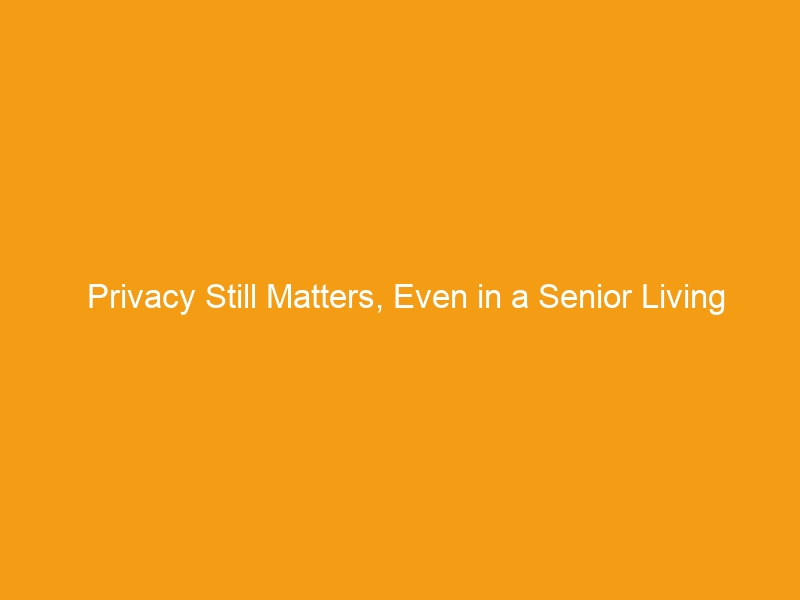When older people move into a senior living home, things can change a lot. They might have caregivers helping with meals, medicine, or even getting dressed. They might live around other people their age and have nurses or staff walking in and out during the day. That can feel kind of weird, especially for someone who’s used to having their own space and doing things their own way.
But here’s something important: just because someone moves into a place where they need more help doesn’t mean they lose their privacy. People don’t stop being people just because they get older. They still have rights, and one of those rights is the right to keep certain things private.
This matters way more than most people think. And it’s not just about shutting the door when changing clothes or having quiet time. It’s also about things like personal records, phone calls, and medical care.
Seniors Still Have Control Over Their Lives
Living in a senior care home doesn’t mean someone gives up all control. In fact, they’re supposed to have a say in how things are done, especially when it comes to their own life.
For example, if someone wants to keep their mail unopened until they read it themselves, that’s their right. If they want their medical records to stay between them and their doctor, that’s also their right. Care staff should always knock before entering a room, even if they’ve helped that person a hundred times before.
These rules are in place to protect privacy. They’re not just suggestions—they’re legal rights. A guide like this one on Privacy Rights in Senior Living can help explain what those rights look like in real life.
Even when someone needs help every day, they’re still the boss of their own personal space and information. No one should forget that.
Private Spaces Should Stay Private
Most senior living homes try to make each room feel like a home. That might mean the person lives in a private room or shares one with a roommate. Either way, it’s supposed to be treated with respect.
If a caregiver needs to come in, they should knock first. If the resident is getting dressed or taking a nap, the staff should wait. This might sound like a small thing, but it makes a huge difference.
It’s not about the size of the room. It’s about treating the person who lives there with basic respect. Everyone needs a space that feels like theirs, no matter where they live.
Personal Information Should Stay Personal
When someone moves into a care home, they often have to share a lot of information. Things like health conditions, medications, or even their favorite foods. That information helps the staff take better care of them. But it’s not something that should be shared around without permission.
Laws say this kind of information is private. It should only be shared with people who actually need to know, like doctors or certain staff. No one should be talking about someone’s medical issues in front of others, and definitely not where other residents or visitors can hear.
This rule also applies to things like phone calls or video chats. If a senior wants to have a private conversation with family or friends, they should be able to do that without someone listening in.
Visitors and Family Boundaries
Families usually want to check in and make sure everything’s going okay. That’s great, but even then, boundaries matter. Just because someone is older doesn’t mean their family can barge in at any time or ask for private information without permission.
If a senior says they only want visitors during certain hours, that should be respected. If they don’t want to talk about a health issue with their grandkids or cousin, they shouldn’t be forced to. Having a close relationship with family is awesome, but it should still happen on the senior’s terms.
Senior living homes should have clear rules to protect that privacy. Good places take those rules seriously and train their staff to follow them all the time.
What Happens If Privacy Gets Ignored?
Sometimes, things don’t go the way they should. Maybe a caregiver walks in without knocking. Maybe someone’s health information gets discussed too loudly. If that happens, the resident—or their family—has the right to speak up.
Most homes have a way to file complaints or talk to a manager about what’s going on. There are also state and national laws that protect seniors if something more serious happens, like their rights getting violated again and again.
It’s not being rude to say, “That’s not okay.” It’s standing up for basic human rights.
Feeling Safe Means Feeling Respected
Privacy isn’t just about being left alone. It’s about feeling safe, comfortable, and in control. When a person feels like their space, thoughts, and choices are respected, they’re more likely to feel at ease in their new home.
This is true for everyone, no matter their age. When a senior knows that their door won’t be opened without a knock, their medical info won’t be shared without asking, and they get to decide who visits and when—it helps them feel calm and respected.
And when someone feels respected, they’re more likely to enjoy where they live.
The Bottom Line
Getting older doesn’t mean giving up on privacy. Whether someone is 18 or 88, they still have the right to decide what’s shared, who’s allowed into their space, and how their personal information is handled.
Senior living homes should be places where people feel cared for—but also where they feel respected. Privacy is a big part of that. It’s not just a nice bonus. It’s something every resident deserves, every single day.
If you know someone who lives in a senior home, ask them how they feel about their privacy. If something doesn’t seem right, speak up. These rights matter, and making sure they’re respected helps everyone live better.

